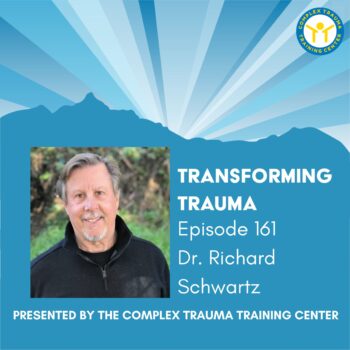Transforming Trauma Episode 161: No Bad Parts and the Self in Healing with Dr. Richard Schwartz, Internal Family Systems
A podcast brought to you by the Complex Trauma Training Center
Many of us hold the convenient belief that we possess a single identity. Dr. Richard Schwartz began challenging the flatness of that assumption in the early 1980s. His curiosity led to the creation of the Internal Family Systems Model (IFS), which recognizes the role of internal “parts” or subpersonalities that resemble a family structure. Forty years later, Dick continues to expand on the model, exploring its capacity to resolve interpersonal conflicts, address broader societal issues, and reconnect us to our innate humanity.
On this episode of Transforming Trauma, host Emily Ruth is thrilled to welcome back Dr. Richard Schwartz, PhD, author, academic, and creator of the Internal Family Systems Model. The pair discusses how IFS helps clients reclaim their agency, restore inner harmony between their diverse parts, and strengthen their capacity to reveal their true self. Emily also invites Dick to expand on the similarities between IFS and other therapeutic modalities, including the NeuroAffective Relational Model®, especially as both seek to de-pathologize individuals.
The conversation includes Dick offering his view of the current state of our society and world, challenging us to attend to the root causes of polarization and dehumanization with compassion. “If we really got that there are no bad parts, culturally, it would make a huge difference in everything,” Dick states.
Dick developed the idea of “parts” while serving as a family therapist and an academic at the University of Illinois at Chicago. There, he discovered that family therapy alone did not achieve full symptom relief. Dick’s patients became his teachers as they described how their parts formed networks of inner relationships that resembled the families he had been working with. He also found that as they focused on and, thereby, separated from their parts, they would shift into a state characterized by qualities like curiosity, calm, and confidence. Dick called that inner essence the “self” and was amazed to discover it even in severely diagnosed and traumatized patients. From these explorations the Internal Family Systems (IFS) model was born.
“There are parts that are frozen in scenes where they showed what I call self-leadership, and they were hurt more,” observes Dick. He refers to these inner parts as exiles because they are in hiding most of the time, consumed by terror. Clinicians must proceed mindfully, asking the protector-parts for permission to engage, for instance, with these fearful parts rather than exposing them. “As we do, more and more self shows up,” Dick says.
Emily invites Dick to share how Self-Agency is supported in the IFS model. “Agency can be quite threatening to a lot of clients,” says Dick. “Severe trauma survivors have parts that are terrified of them having agency or showing up because when they did, they would be punished or tortured more,” Dick begins. “That’s particularly true of people with chronic trauma who were tortured a lot. They have parts (like the inner critic, protector, or rival) that want to keep them very small, passive, and not show themselves.”
Dick describes the eight C’s of self-leadership — calm, curiosity, compassion, confidence, clarity, courage, creativity, and connectedness. As these characteristics become more pronounced, certain parts may feel threatened. “As you access self, there’s often a backlash,” Dick shares.
“I work with many trauma clients where, in the beginning, it seems hopeless because they’re so dominated by these brutal protectors and there’s no self to be found. Then, as I get these protectors to trust me, the same self pops out that pops out in everybody else,” he says. “Once you get that little sliver of self going, things change quickly. If we can bring more self to the planet, it will begin to heal itself. I don’t know that that’s true for sure, but that’s what keeps me going.”
Transforming Trauma is grateful to Dr. Schwartz for shifting the therapeutic paradigm towards a more compassionate perspective. We’re thankful for his commitment to healing self, making the world a more just and interconnected place.
RECOMMENDED EPISODES
The Spiritual Elements of Trauma Healing with Drs. Dick Schwartz and Laurence Heller
Internal Family Systems (IFS) and NARM with Dick Schwartz and Laurence Heller
Listening to What Survivors Need to Address Sexual Trauma and Complex PTSD with Dr. Judith Herman
MENTIONED IN THIS EPISODE
No Bad Parts: Healing Trauma and Restoring Wholeness with the internal Family Systems Model
The Internal Family Systems Workbook
GUEST CONTACT & BIO
Richard C. Schwartz, PhD, is the creator of Internal Family Systems, a highly effective,
evidence-based therapeutic model that de-pathologizes the multi-part personality. His IFS
Institute offers training for professionals and the general public. He is currently on the faculty of
Harvard Medical School, and has published five books, including No Bad Parts: Healing Trauma
and Restoring Wholeness with the Internal Family Systems Model. Dick lives with his wife
Jeanne near Chicago, close to his three daughters and his growing number of grandchildren.

Subscribe for All Episodes
on your Favorite Service:
We want to connect with you!
Facebook @ComplexTraumaTrainingCenter
Twitter @CTTC_Training
YouTube
Instagram @cttc_training
Learn more about The Complex Trauma Training Center: http://www.complextraumatrainingcenter.com